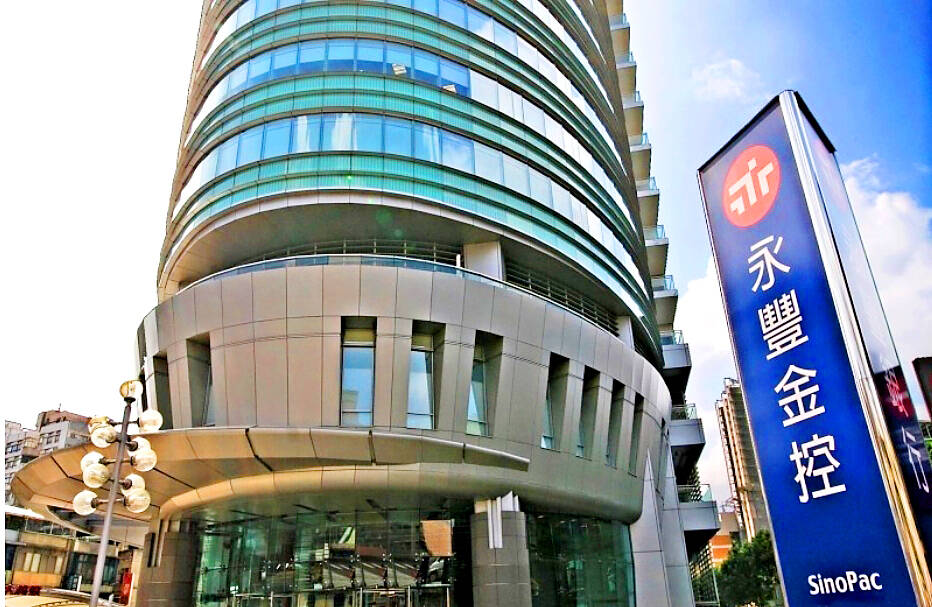SinoPac Financial Holdings Co (永豐金控) said yesterday that it plans to buy 100 percent of King’s Town Bank (KTB, 京城銀行) for NT$60 billion (US$1.83 billion) through cash and share swaps.
The two financial institutions would seek approval from regulators and shareholders next year, after respective board directors yesterday gave the green light, SinoPac spokesperson Kerry Hsu (許如玫) told reporters at the Taiwan Stock Exchange last night.
SinoPac would sponsor the deal with 50 percent in cash and the remaining half through a share swap scheme, Hsu said.

Photo: Kelson Wang, Taipei Times
Under the share swap arrangement, one common KTB share would trade for 1.15 SinoPac shares, Hsu added.
“We believe that the deal, valued at 1.1 times King’s Town’s price-to-book ratio, is reasonable, as the merger would enable SinoPac to reach out to more customers in southern Taiwan,” SinoPac Financial president Stanley Chu (朱士廷) said.
Most of King’s Town’s 66 branches are in Yunlin County, Chiayi County, Tainan, Kaohsiung and Pingtung County, while most of SinoPac’s 125 outlets are in northern Taiwan, Chu said.
SinoPac would retain all KTB employees for at least three years, Chu said, adding that SinoPac would provide bonuses for those who choose to stay, especially banking professionals.
The merger would make SinoPac Taiwan’s seventh-largest conglomerate by assets and the third-largest lender measured by loans to small and medium-sized enterprises (SME), Hsu said.
The synergy benefits also apply to banking services, given that KTB focuses on commercial banking, while SinoPac is more specialized in institutional banking and serving firms with larger amounts of capital, Chu said.
KTB chairman Tai Chen-chih (戴誠志) and vice chairman Tsai Chiung-ting (蔡炅廷) would not join SinoPac’s boardroom after an expected one-year integration because they prefer to be shareholders and trust SinoPac’s management, Chu said.
KTB would auction off its capital leasing unit and liquidate its securities arm, Chu said, adding that the former has a different business orientation from SinoPac’s capital leasing unit.
KTB’s securities house is small and should be able to settle its business with its current clients, Chu said.
Shares in SinoPac yesterday closed down 0.42 percent at NT$23.6, while KTB shed 0.9 percent to NT$49.55, Taiwan Stock Exchange data showed.

IN THE AIR: While most companies said they were committed to North American operations, some added that production and costs would depend on the outcome of a US trade probe Leading local contract electronics makers Wistron Corp (緯創), Quanta Computer Inc (廣達), Inventec Corp (英業達) and Compal Electronics Inc (仁寶) are to maintain their North American expansion plans, despite Washington’s 20 percent tariff on Taiwanese goods. Wistron said it has long maintained a presence in the US, while distributing production across Taiwan, North America, Southeast Asia and Europe. The company is in talks with customers to align capacity with their site preferences, a company official told the Taipei Times by telephone on Friday. The company is still in talks with clients over who would bear the tariff costs, with the outcome pending further

A proposed 100 percent tariff on chip imports announced by US President Donald Trump could shift more of Taiwan’s semiconductor production overseas, a Taiwan Institute of Economic Research (TIER) researcher said yesterday. Trump’s tariff policy will accelerate the global semiconductor industry’s pace to establish roots in the US, leading to higher supply chain costs and ultimately raising prices of consumer electronics and creating uncertainty for future market demand, Arisa Liu (劉佩真) at the institute’s Taiwan Industry Economics Database said in a telephone interview. Trump’s move signals his intention to "restore the glory of the US semiconductor industry," Liu noted, saying that

NEGOTIATIONS: Semiconductors play an outsized role in Taiwan’s industrial and economic development and are a major driver of the Taiwan-US trade imbalance With US President Donald Trump threatening to impose tariffs on semiconductors, Taiwan is expected to face a significant challenge, as information and communications technology (ICT) products account for more than 70 percent of its exports to the US, Chung-Hua Institution for Economic Research (CIER, 中華經濟研究院) president Lien Hsien-ming (連賢明) said on Friday. Compared with other countries, semiconductors play a disproportionately large role in Taiwan’s industrial and economic development, Lien said. As the sixth-largest contributor to the US trade deficit, Taiwan recorded a US$73.9 billion trade surplus with the US last year — up from US$47.8 billion in 2023 — driven by strong

STILL UNCLEAR: Several aspects of the policy still need to be clarified, such as whether the exemptions would expand to related products, PwC Taiwan warned The TAIEX surged yesterday, led by gains in Taiwan Semiconductor Manufacturing Co (TSMC, 台積電), after US President Donald Trump announced a sweeping 100 percent tariff on imported semiconductors — while exempting companies operating or building plants in the US, which includes TSMC. The benchmark index jumped 556.41 points, or 2.37 percent, to close at 24,003.77, breaching the 24,000-point level and hitting its highest close this year, Taiwan Stock Exchange (TWSE) data showed. TSMC rose NT$55, or 4.89 percent, to close at a record NT$1,180, as the company is already investing heavily in a multibillion-dollar plant in Arizona that led investors to assume